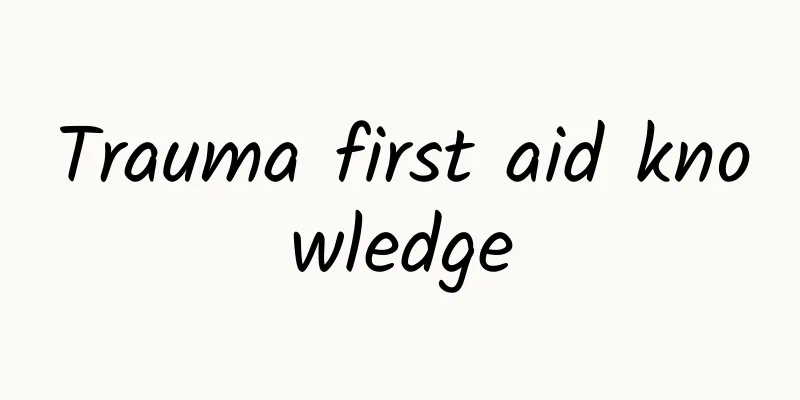Trauma first aid knowledge

|
Four techniques of trauma first aid: hemostasis, bandaging, fixation, and transportation. 1. Stop bleeding Commonly used methods of stopping bleeding: 1. Press: Use fingers or palms to press and stop bleeding; 2. Bandage: Cover with gauze or clean cloth and bandage to stop bleeding; 3. Filling: Use gauze or clean cloth to fill deep wounds; 4. Tie: Use a tourniquet. When using, you should choose one method or combine several hemostatic methods according to the specific situation to achieve the fastest, most effective and safest hemostasis purpose. Finger pressure artery hemostasis method: It is suitable for heavy bleeding in certain parts of the head and limbs. The method is to press the artery near the wound with your fingers, press the artery to the deep bone, and block the blood circulation. This is a simple and effective method of hemostasis that does not require any equipment, but because the hemostasis time is short, it often needs to be combined with other methods. 1. Finger pressure artery hemostasis method on the head and face. The hemostatic arteries on the head and face are shown in the figure. 2. Arterial pressure hemostasis method for the limbs. 3. Packing and compression to stop bleeding. 4. Tourniquet for hemostasis. It is used when there are major blood vessel injuries, large wounds, and heavy bleeding in the limbs. Precautions for using tourniquet: 1. Add padding 2. Record time 3. Relax slowly for 5 minutes every half hour. 4. Use acupressure to stop bleeding during relaxation. 5. The cloth tourniquet is inelastic, so be careful to prevent limb injuries. It is forbidden to use steel wire, rope, etc. as a tourniquet. 2. Bandaging Purpose of bandaging: 1. Stop bleeding 2. Anti-pollution 3. Protect tissues and internal organs Tip: Use local materials Dressing: Cover the wound with gauze, wrap the bandage around the limb with 4-5 layers under a certain pressure, tear the center of the bandage tail and tie a knot around the limb. The gauze should be thick enough and the covering area should be at least 3 cm larger than the wound. You can also use a triangular bandage, handkerchief, clean cloth, etc. to bandage and stop bleeding. Head wound The scalp has rich blood supply and bleeding is more frequent, often accompanied by skull fractures and craniocerebral injuries. Note: If there is leakage from the ears or nose, it indicates a skull base fracture. The ears and nostrils should not be blocked at this time. Treatment of foreign bodies in wounds: 3. Fixation On-site fracture fixation Limb manifestations after fracture 1. Severe pain 2. Local swelling 3. Limb deformity 4. Dysfunction Purpose of fixation: 1. Reduce secondary damage 2. Reduce pain 3. Powerful handling Fixed basic requirements: 1. Fixation should be reliable 2. Not too loose or too tight 3. Cross joints 4. Add padding to fractures and joint protrusions It is contraindicated to reduce fractures on site Neck fixation: 4. Transportation Correct handling 1. Evaluation after hemostasis and bandage fixation is completed 2. Pinto 3. Axis flip 4. Smooth movement 5. Can reduce the patient's pain 6. Prevent further damage Popular Science Doctor: Guo Linsen Workplace: Yangbu Town Central Hospital, Pingyu County, Henan Province |
<<: After “Yang Kang”, you need to pay attention to these things!
Recommend
Don’t let happiness become an invisible price for your health when drinking during the New Year
Quan Haoxian, Tongji Medical College, Huazhong Un...
Cancer is associated with atrial fibrillation! Results of a study of 820,000 patients in South Korea
A nationwide study in South Korea covering nearly...
Pregnant women have dry and hard stools with blood on the surface in autumn
Pregnant women must keep their bodies healthy so ...
Is there a cure for dysmenorrhea in girls?
Dysmenorrhea is a gynecological disease that ofte...
Causes of nighttime vulvar itching
I believe that female friends are no strangers to...
Urethra pain after going to toilet
If you feel pain in your urethra after going to t...
A woman dreams of two snakes entangled together
Snakes are small crawling animals, and many peopl...
Can a mother breastfeed if she is positive? What are the symptoms of a newborn baby infected with the new coronavirus? Experts say...
Recently, with the optimization and adjustment of...
What is a mobile hard disk used for? How to partition a mobile hard disk to create a boot disk
A mobile hard disk can provide a considerable sto...
Which city in my country did braised lion's head originate from? How to eat the frozen lion's head bought from the supermarket?
There are many varieties of braised lion's he...
Green papaya is a great breast enhancement food. These foods are even better for breast enhancement.
Breast enhancement is very important for women. A...
Preventive treatment of common diseases in women
Being a woman is actually very distressing, becau...
Something disappears from a woman's body after she gives birth
Some people say that having a child is a woman’s ...
What will happen to your body if you eat one salted duck egg a day? Is it "greasy" and has a very high fat content?
We have to admit that salted duck eggs are defini...
What kind of fish is used for frying small fish? Which small fish is the best to fry?
We all know that there are many ways to eat fish,...









